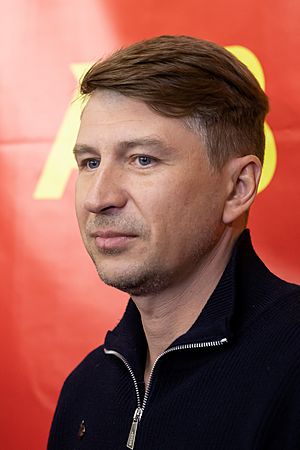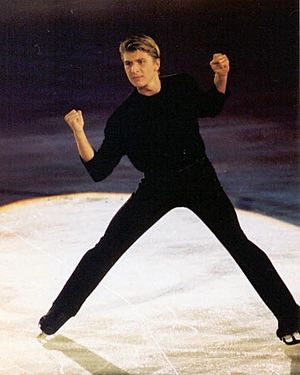Alexei Yagudin facts for kids
Quick facts for kids Alexei Yagudin |
|
|---|---|

In 2022
|
|
| Personal information | |
| Full name | Alexei Konstantinovich Yagudin |
| Country represented | |
| Born | 18 March 1980 Leningrad, Russian SFSR, Soviet Union |
| Height | 1.75 m (5 ft 9 in) |
| Retired | 2003 |
Alexei Konstantinovich Yagudin (Russian: Алексей Константинович Ягудин; born March 18, 1980) is a famous Russian figure skater. He is known for winning the gold medal at the 2002 Winter Olympics. Alexei also won the World Championships four times (in 1998, 1999, 2000, and 2002). He was a three-time European champion (1998, 1999, 2002). He also won the Grand Prix of Figure Skating Final twice. In 1996, he became the World Junior champion.
Alexei Yagudin is the only figure skater to achieve a "Golden Slam." This means he won all major championships in one season (2001–2002). These championships include the Olympic Games, World Championships, European Championships, and the Grand Prix Final. In 2003, he received the Order of Merit for the Fatherland award from Russia. In 2017, he was added to the World Figure Skating Hall of Fame.
After he stopped competing, Yagudin became a professional skater. He performed in many ice shows. He also worked as a show host, an actor, and a figure skating commentator for Russian TV. In 2019, he opened his own Figure Skating Center in Minsk, Belarus, where he now coaches.
Contents
Early Life and Training
Alexei Yagudin was born on March 18, 1980, in Leningrad, which is now Saint Petersburg, Russia. His mother, Zoya, introduced him to skating when he was four years old. She thought it would help him stay healthy.
Alexei learned many difficult jumps at a young age. He could do all his double jumps before he turned ten. He mastered five triple jumps before he was twelve. He even landed the triple Axel jump before he was thirteen. His first coach was Alexander Mayorov. Later, he trained with the famous Russian coach Alexei Mishin from 1992 to 1998.
Skating Career Highlights
Starting His Career
Yagudin began competing internationally in 1994. He quickly showed his talent. In 1996, he won the World Junior Championships. This was a big step in his early career. While training with Alexei Mishin, he started a famous rivalry with another Russian skater, Evgeni Plushenko. This friendly competition became even more intense after Yagudin changed coaches.
Becoming a Senior Skater
In 1997, Yagudin competed in the World Championships for the first time. He won a bronze medal, which was a great achievement.
In 1998, he won the European Championships. He led a Russian sweep, with Plushenko and Alexander Abt also winning medals. Later that year, he competed in the 1998 Nagano Winter Olympics. He finished in 5th place despite being sick. A month later, he won the 1998 World Championships. He was only 18 years old, making him one of the youngest male World Champions ever. After this, Yagudin began training with Tatiana Tarasova, who coached him until he retired in 2003.
During the 1998–99 season, Yagudin had an amazing year. He won eleven out of thirteen competitions. This included beating Kurt Browning at the World Professional Championships. He also won the Grand Prix Final. He continued his success by winning his second European title in 2000. He also won his third straight World title in Nice, France.
The 2000–01 season was a bit challenging for Yagudin due to injuries. He still managed to win a silver medal at the World Championships in Vancouver, Canada. His performance of The Revolutionary Etude in the short program earned him a standing ovation.
Olympic Glory
The 2001–02 season was Yagudin's best. He started by winning a bronze medal at the 2001 Goodwill Games. He then won the Grand Prix Final and regained his European title.
At the 2002 Winter Olympics in Salt Lake City, Yagudin won the gold medal. He received first-place votes from every judge. He also earned four perfect 6.0 scores for his free skate. This was the most perfect scores for an Olympic performance since 1984. After the Olympics, Yagudin won his fourth World title. He received six perfect 6.0s for his short program and two more for his free skate. He was the first singles skater to get six perfect marks for the short program.
After this incredible season, Yagudin was diagnosed with a hip problem. Doctors told him to rest, but he chose to compete at 2002 Skate America. He won the short program but had to withdraw due to his injury. He then announced his retirement from competitive skating. His last performance as a competitive skater was at a farewell gala at Skate Canada.
Professional Skating and Other Work
After retiring from competitive skating in 2003, Yagudin became a professional skater. He toured with shows like Stars on Ice and Ice Symphony. He also worked as a consultant coach for other skaters.
Since 2005, Yagudin has performed in many Russian ice shows. He also took part in the popular Russian TV show Stars on Ice, which was later renamed Ice Age. In 2007, he had surgery to get a titanium hip joint. After this, he thought about returning to competitive skating, but another injury made it too difficult.
In 2010, he performed in shows in Korea and China. He continues to perform his popular Winter program in shows around the world. In 2017, he was honored by being inducted into the World Figure Skating Hall of Fame. In 2019, he opened his own Figure Skating Center in Minsk, Belarus, where he coaches young skaters.
Acting and Hosting
Alexei Yagudin has also had a successful career in Russian television. He has worked as a show host, an actor, and a figure skating commentator.
In 2006, he participated in Stars on Ice with gymnast Oksana Pouchkina. He later continued on Ice Age with pop singer Victoria Dayneko. In 2008, he made his acting debut in a play called The President's Vacation. He also starred in a Russian TV series about figure skating called Hot Ice (2009).
In 2009, he became a host for the TV show Good evening, Moscow!. In 2010, he performed in the ice musical City Lights. He also returned to Ice Age for two more seasons with actress Valeria Lanskaya. In 2013, he acted in a play called Don't Trust Your Eyes. He has also hosted the TV series I Want to Know, where he interviews people about their culture. Since 2019, he hosts his own show called Ice is melting with Alexei Yagudin, where he interviews athletes.
Personal Life
Alexei Yagudin moved to the United States in 1999 to train with Tatiana Tarasova. He lived there for almost seven years before returning to Russia.
In 2016, Yagudin married Olympic pair skating champion Tatiana Totmianina. They have two daughters. Their first daughter, Elizaveta, was born in 2009. Their second daughter, Michèle, was born in 2015. The couple hopes their daughters will focus on studying and music rather than competitive skating. The Yagudin family lives in Moscow and France.
Awards and Recognition
- Order of Merit for the Fatherland, 4th class (2003) – for his great contributions to sports, especially at the 2002 Olympic Games.
- National Sports Award "Glory," "Best Athlete of 2002."
- 2017 World Figure Skating Hall of Fame inductee.
Programs
| Season | Short program | Free skating | Exhibition |
|---|---|---|---|
| 2002–2003 |
Racing by Safri Duo |
The Man in the Iron Mask by Nick Glennie-Smith |
Born to Be Wild by Steppenwolf Memorial by Michael Nyman |
| 2001–2002 |
Winter by Bond |
Overcome (from Ancient Lands) by Ronan Hardiman The Man in the Iron Mask by Nick Glennie-Smith |
|
| 2000–2001 |
The Revolutionary Etude by Frédéric Chopin |
Gladiator by Hans Zimmer |
Gladiator by Hans Zimmer Stand by Me by Ben E. King My Baby You by Marc Anthony We Are the Champions by Queen |
| 1999–2000 | Nutrocker by Emerson, Lake & Palmer |
Broken Arrow by Hans Zimmer Tosca by Giacomo Puccini |
Come Fly with Me by Barry Manilow September Morn by Neil Diamond |
| 1998–1999 | Circus (from The Revisionist's Tale) by Alfred Schnittke |
Lawrence of Arabia by Maurice Jarre |
Here Comes the Big Parade by Harry Connick, Jr. The Prince of Rose |
| 1997–1998 | Ziganotchka (Russian Gypsy Music) |
Troika; or, Snowstorm by Georgy Sviridov |
Play It Again, Satchmo by Louis Armstrong Mack the Knife (from The Threepenny Opera) by Kurt Weill |
| 1996–1997 | Ruslan and Lyudmila by Mikhail Glinka |
Carmen by Georges Bizet |
One Banana (African Music) |
| 1995–1996 | The Nutcracker by Pyotr Ilyich Tchaikovsky |
Gaîté Parisienne by Jacques Offenbach |
|
| 1994–1995 | Toccata and Fugue in D minor by Johann Sebastian Bach |
Hussar medley | |
| 1993–1994 | Concierto de Aranjuez by Joaquín Rodrigo Performed by Paco de Lucía |
Competitive Results
GP: Champions Series / Grand Prix
| International Competitions | |||||||||
|---|---|---|---|---|---|---|---|---|---|
| Event | 93–94 | 94–95 | 95–96 | 96–97 | 97–98 | 98–99 | 99–00 | 00–01 | 01–02 |
| Olympics | 5th | 1st | |||||||
| Worlds | 3rd | 1st | 1st | 1st | 2nd | 1st | |||
| Europeans | 6th | 5th | 1st | 1st | 2nd | 2nd | 1st | ||
| GP Final | 5th | 4th | 1st | 2nd | 1st | ||||
| GP Cup of Russia | 2nd | 1st | |||||||
| GP Lalique | 1st | 1st | 1st | 1st | 1st | ||||
| GP Nations/Spark. | 3rd | 1st | |||||||
| GP Skate America | 3rd | 1st | 1st | 2nd | |||||
| GP Skate Canada | 1st | 1st | 1st | ||||||
| Goodwill Games | 8th | 3rd | |||||||
| Prague Skate | 3rd | ||||||||
| International: Junior Competitions | |||||||||
| Junior Worlds | 4th | 1st | |||||||
| National Competitions | |||||||||
| Russian Champ. | 5th | 5th | 4th | 3rd | 2nd | 2nd | 2nd | 2nd | |
See also
 In Spanish: Alekséi Yagudin para niños
In Spanish: Alekséi Yagudin para niños
 | Laphonza Butler |
 | Daisy Bates |
 | Elizabeth Piper Ensley |


